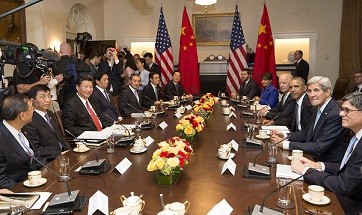The first round of cybersecurity talks started Tuesday, Dec. 1, as top Chinese and U.S. officials convened in Washington for talks of the bilateral anti-hacking accord signed in September, Reuters reported.
State Counselor and Minister of Public Security Guo Shengkun, who will be staying in Washington through Sunday, is scheduled to meet U.S. Secretary of Homeland Security Jeh Johnson and U.S. Attorney General Loretta Lynch.
According to the report, the talks, which will be held on Tuesday and Wednesday, are significant in establishing acceptable norms for cyber espionage. The talks are also expected to repair bilateral relations after China withdrew from a working group last year in response to the U.S. indictment of five members of its military charged with involvement in the hacking of six U.S. companies.
The report said that cybersecurity has strained relations between China and the United States, despite strong economic ties worth $590 billion in bilateral trade agreement last year.
The September agreement sealed during President Xi Jinping's official state visit to Washington included a pledge that required the two countries to refrain from carrying out hacking activities for commercial advantages.
The agreement was also aimed at implementing the five-point consensus reached by the two sides during the U.S. visit of Meng Jianzhu, secretary of the Committee of Political and Legal Affairs (CPLA), CPC Central Committee in early September, the Xinhua News Agency reported.
The pact also stressed the unspoken agreement among many countries that hacking for traditional espionage purposes is fair game, but infiltrating private sector computer systems for economic gain should be prohibited.
The Group of 20 nations has also agreed to a similar set of hacking rules barring espionage on the private sector earlier this month.
At the dialogue held in September, the two sides have reached an agreement on the guidelines on joint China-U.S. fight against cybercrimes and related matters, and the setting up of a hotline.
The two countries also identified areas for future cooperation on enhancing cybersecurity and fighting cyber terrorism, as well as specific programs to strengthen capability building in fighting cybercrimes.
The two sides agreed to hold the next cybersecurity ministerial dialogue in Beijing in June next year.



























